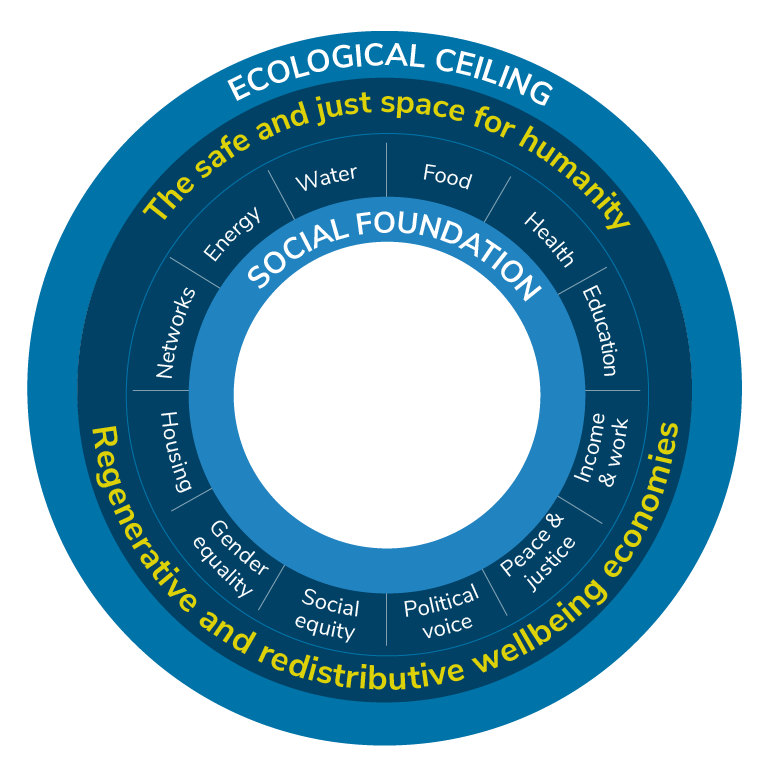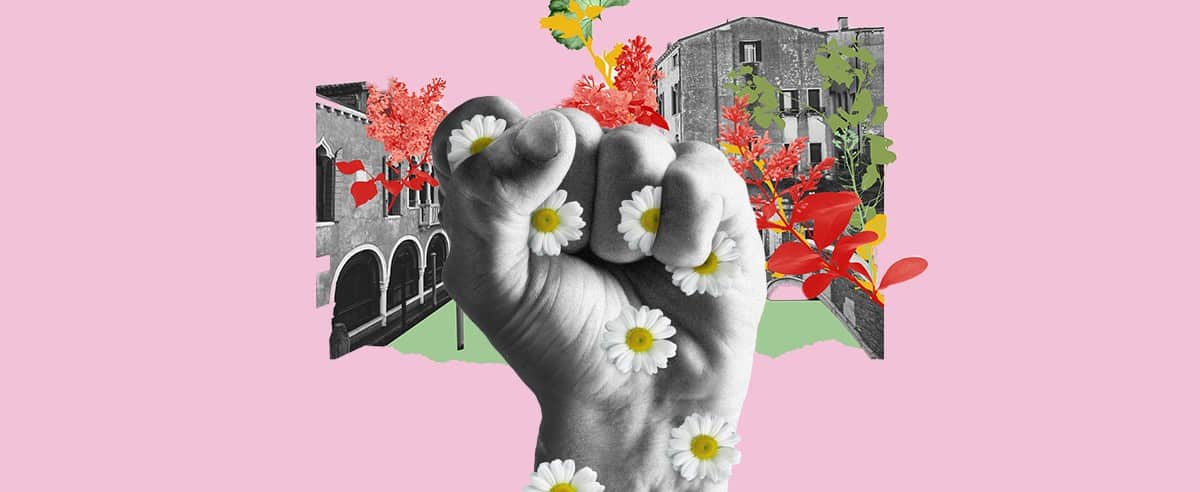Health isn’t just part of the economy; it is the economy. If we’re to create a fairer, more sustainable, and healthier future for everyone in Europe, we need to put health at the centre of our economic thinking. EuroHealthNet’s Senior Research Coordinator, Alba Godfrey, discusses.
What exactly does ‘wellbeing’ mean?
At face value, it sounds simple enough. After all, ‘wellbeing’ is about ‘being well’ both physically and mentally, feeling ‘healthy and happy’. And although this may seem straightforward, scratch the surface, and things get a little more complicated.
The question is: what does it really take to be well, healthy, and happy? A good place to start when looking for answers is Kate Raworth’s Doughnut Economy. She puts forward a vision where being well is dependent on access to and fair distribution of essentials, such as health, food, water, energy, housing, education, and income, without pushing the planet past its limits.
The basics that underpin a good life
The model’s Social Foundation also sets out the basics that underpin a good life; not just material necessities but also core human needs such as social and gender equality, supportive networks, having a political voice, and peace and justice. Crucially, these essentials can only serve as the basis for a safe and just space in which humanity can thrive if they are surrounded by an Ecological Ceiling. In other words, if the planet itself is a safe environment in which to live.
Starting to get more complicated? Yes, perhaps. It might even feel like we’re moving away from that initial idea of being ‘healthy and happy’. In truth, we’re moving towards a fuller understanding of what that really means. When we take a closer look, the Social Foundation and the Ecological Ceiling are fundamentally about health. This is health in the broadest sense of the world. We’re not just talking about prescriptions and waiting times for care, but about the social, economic, commercial, political, and environmental determinants of health – the conditions in which people are born, grow, live, work, and age.
Taking this way, health isn’t just one part of the Doughnut, it’s at its heart.
A wellbeing economy, in Doughnut terms, is one that enables everyone to live healthy and happy lives, with dignity and purpose, within planetary boundaries. And the keyword here is everyone. A society that lets some thrive while others struggle isn’t truly well. Reducing inequalities across income, gender, geography, and generations is central to the model.

Wellbeing doesnt happen in isolation
Linking wellbeing with health in its broadest sense helps to understand that being well doesn’t happen in isolation–it’s, in fact, a collective effort. Individual wellbeing is deeply tied to community and societal wellbeing. Social cohesion and progress are essential for a good quality of life. So, we’re all in this together, quite literally.
For some, it might seem strange that an organisation like EuroHealthNet (focused on public health) is discussing and promoting wellbeing economic ideas. I mean, after all, isn’t that a job for economists? But, when we consider this wider definition of wellbeing, it makes perfect sense. Health is something shaped by our economies, societies, and environment. It’s a natural fit for public health, and those working in the health and social sectors do not play a mere sideline role to this but are essential to the conversation.
In doing so, sectoral gaps are bridged, and policymakers can see how health and social professionals can contribute to wellbeing economic discussions, and show economists how critical it is to centre health in their thinking.
Making economic sense
We’re not just talking about values here; the figures add up too. Good health is something that we can all relate to and wish to attain, for ourselves and for our loved ones. Investing in conditions that shape health doesn’t just make moral sense; it makes economic sense, too. Evidence shows that every euro invested in public health has the potential to bring up to 14 euros in economic benefits, principally through lower healthcare costs, increased productivity, and stronger social cohesion.
The climate connection
Then there’s the climate connection. The link between healthy people and a healthy planet isn’t just poetic, it’s practical and real.[i] Investing in better environmental conditions, to ensure that the planet is a safe and healthy place for all, is both an ethical necessity and a smart economic strategy. A recent systematic review published in The Lancet Planetary Health shows that many studies find the costs of ‘net zero’ policies are more than offset by the health-related economic benefits. Tackling air pollution, unhealthy diets and physical inactivity are key focus areas.
Where do we from here?
As with defining ‘wellbeing’, there’s no single answer. But we know some essentials. One is the importance of working across levels of governments and across sectors – health, education, environment, finance – to create a collaborating force of joined up policy that reflects real lives. Another essential is working with communities. A wellbeing economy must be inclusive and participatory, helping to build trust and rooted in lived experiences, responsive to people’s needs, both now and in the future.
We also need action from governments. That means passing legislation that enshrines wellbeing goals, providing clear mandates for action, backed by budgets and long-term action plans. It means regulating the private sector, especially where corporate interests undermine health. Crucially, it also means measuring what matters. We need to move away from assessing a country’s economic performance by its military spending or polluting industries, and instead focus on what really matters: people’s health and wellbeing. Monitoring outcomes is critical to demonstrate impact and ensure accountability.
Most of all, perhaps, we need leadership. We need committed, driven individuals and organisations to lead the way and inspire change at the highest levels of policy and on the ground in local communities. We all have agency and influence in both our professional and personal lives, whether in public service, civil society, business, or a local community group–our voices matter. The time to act is now. Changing to a wellbeing economy won’t happen overnight, but it’s necessary, and above all, it is possible.
The realisation that health isn't just a sector but a thread running through every aspect of our lives, is what keeps me going, even on days when it seems like we’re moving backwards rather than forwards.
Putting health at the heart of this transition can help focus and drive change, steering us towards a wellbeing economy, one built on equity, resilience, and care.

Alba Godfrey
Alba is the Coordinator of the Research Platform. She focuses on the area of environmental health and health equity, helping to translate cutting-edge research into policy and practice and advocate for a green and just transition. Alba leads EuroHealthNet’s contribution in a number of Horizon Europe & Horizon 2020 projects, including BEST-COST (on improving methodologies for the socio-economic cost assessment of environmental stressors such as air pollution), PSLifestyle (on co-creating an online tool to enable everyone to take personalised steps towards more sustainable lifestyles), BlueAdapt (on adapting to climate-change induced changes in our waters in ways that reduce health impacts), and RESONATE (on building individual and community resilience through nature-based therapies).
